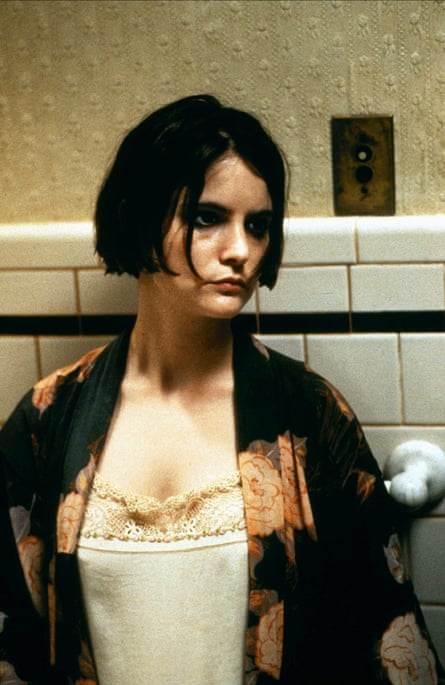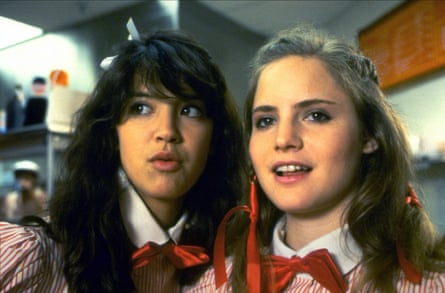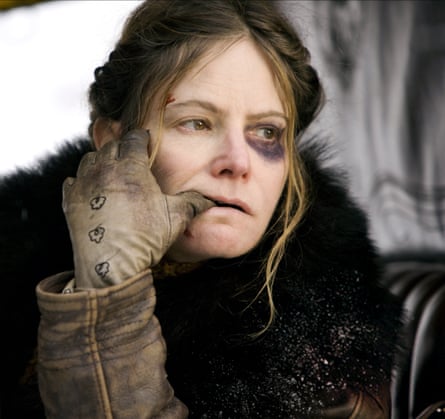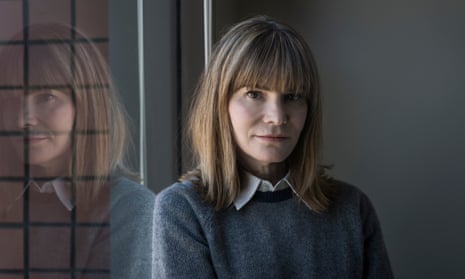In the corner of an almost empty British-themed pub in Hollywood, a woman sits with a fringe concealing half her face. At the age of 56, Jennifer Jason Leigh remains an enigma. A chameleon who can do ethereal and gritty, ravishing and repellent, fragile and fierce, she was Tralala, the doomed prostitute in Last Exit to Brooklyn; Hedy, the stalker flatmate in Single White Female; and Daisy, the homicidal fugitive in The Hateful Eight. A child actor turned 90s film-noir queen, she veered from mainstream stardom into indie projects, then the Hollywood wilderness, before roaring back in recent years. All the while, she has kept a veil over her private life.
“There was a time, when I was dating in my early 30s or late 20s, where people would meet me and think that I was going to be a wild or risk-taking dramatic young woman,” she says softly, pouring milk into her tea. “I’ve always avoided drama in my life. I just like it on screen.”
But during the next hour Jason Leigh does something dramatic: she opens up. After telling me she is selfconscious, that she will leave the interview feeling uneasy if she suspects she has said the wrong thing, she ends up talking so much her tea goes untouched.
She is here to discuss Patrick Melrose, the acclaimed television adaptation of Edward St Aubyn’s autobiographical novels. Benedict Cumberbatch plays Patrick, Jason Leigh plays his mother, Eleanor, and Hugo Weaving plays his father, David, a vile tyrant who traumatises son and wife, driving one to heroin, the other to booze and pills.

“I couldn’t even look at Hugo while we were shooting, even when we were in the makeup trailer together, because he was playing David,” she says. “He couldn’t be a lovelier man, but I couldn’t look at him. But that was a good sign – it meant I was locked in in a way that I need to be.”
She says Cumberbatch’s transformation into a junkie toff, blending physical comedy with harrowing suffering, is seamless. “They should show that at acting school.”
To be locked into a story about a family’s awful dysfunction sounds grim, but Jason Leigh, famous for deep research and immersion, would have it no other way. She read the books years ago and credits David Nicholls with a masterly screen adaptation.
“I reread the novels and would get confused between what was in the screenplay and the book. They got melded in my brain. If ever you got lost in a scene, you could go back and find in the book every sensory detail. They tell you about the taste of Eleanor’s mouth in the mornings – the vomit and the toothpaste and the headache and the sweating.”
Jason Leigh defends the sozzled, overwhelmed Eleanor. “What she does as a mother is obviously monstrous, because she’s drinking to dull every nerve in her body and drugging herself with pills to be obliterated, to go into a space of denial. She can’t save her son. She has been trampled on by David.”
Jason Leigh’s gaze drifts to a bowl of smoked nuts. Her hand traces an invisible pattern over the table’s surface. Then she segues. “My father was very difficult.”
Her parents – Vic Morrow, an actor and director, and Barbara Turner, an actor and screenwriter – separated when she was two. Her father died in a helicopter accident in 1982, while filming a movie version of The Twilight Zone. “We were not close. It’s hard. I don’t really talk about my father publicly, because there are a lot of people that really love him very, very much – his work as an actor. I don’t want to disabuse them [of] their admiration.”

Jason Leigh goes on to talk about her relationship with her sister, Carrie Ann Morrow, who died in 2016, aged 58. “She was a drug addict. I saw a lot of that behaviour growing up and decided at a very young age I didn’t want that. But a part of me obviously wanted to understand and know what it was like, but from a very safe distance. A lot of my pull towards acting was trying to understand my sister – and my father, for that matter.”
She resumes eye contact. “I don’t really like being around people that are drunk. I like playing people that are drunk. You have to lose yourself in acting. That’s why I was drawn to a lot of the roles that I play – they were roles that were very similar to my sister and very far away from me. But it also probably did give me a certain freedom and release, but in a very safe way. Because it’s pretend. That’s what actors do.”
Jason Leigh’s career choices suddenly take on a new light. There have been few romantic or comedy roles, but plenty of grit and torment, notably in Georgia, a 1995 drama written by her mother in which she played a drug-addicted rocker overshadowed by a successful sister. Carrie Ann was credited as a technical adviser.
Meryl Streep, among others, said Jason Leigh deserved an Oscar for Georgia. It did not happen. There were other awards and mainstream appearances in The Hudsucker Proxy, Mrs Parker and the Vicious Circle and Road to Perdition, and artsier roles in Existenz, Palindromes and Synecdoche, New York. But her career did not scale the giddiest heights. Hollywood did not know how to use her properly, said some critics.
Here is another explanation: she recoiled from the hustle – the pitching, networking and chasing. “I’m not really a careerist. I don’t go out a lot or call my agent a lot. I don’t actively pursue jobs maybe in the way I should. I wish I was less introverted. I wish I could enjoy a party. I’m not good at small talk and don’t enjoy it.” She sighs, then laughs. “This is great, this is me getting myself uninvited to every single party. But that’s OK.”
It does not help that Hollywood is infested with creeps. “I have countless stories,” she says. “Not of rape, but of very uncomfortable and awkward situations. Directors keeping you in a meeting for four hours, then saying they wanted to have dinner and were hungry. You’re forced into this situation where you want the job, but ... it feels off.” As a young actor, she lost roles by rebuffing what were then known as lotharios, she says, declining to name names. Her tone is matter-of-fact, not bitter.
She cheers Harvey Weinstein’s downfall and the rise of the #MeToo movement. “It’s obviously not just the film business. It starts with the president of the United States. It’s in every facet of society. People won’t be able to get away with it. The status quo is changing like a hurricane.”

Would she work with Woody Allen? There is a long pause. Her nose crinkles. “No. A lot of my favourite films are Woody Allen films, but I wouldn’t work with him.”
The tea is stone cold.
Jason Leigh’s wilderness phase was not planned. She did some plays and had a baby and the job offers slowed. “There was a period of time when it was very hard for me.”
That changed in 2015. She voiced a key character in Anomalisa, a stop-motion animation that won awards and broke hearts. Then Quentin Tarantino, who has a knack for rediscovering neglected talent, cast her in his western The Hateful Eight. “That really turned my life around.”
Uma Thurman and Rose McGowan have accused Tarantino respectively of bullying and fetishising them, but Jason Leigh lauds him. “I love Quentin, so all I can tell you is that he loves and is so respectful of everyone that he works with. When you get on the set, it feels like a family. He knew more about my career than I did – he was quoting things that I’d done for ever ago as if they were yesterday.”
Jason Leigh also has a soft spot for Daisy, her ruthless desperado character in The Hateful Eight. “She’s a bit of a monster. But I couldn’t feel like that when I was playing her. I felt she was like a family gal. Her family is her gang.”
She won an Oscar nomination for the role and has been busy since, with roles in the Netflix comedy Atypical and David Lynch’s revived Twin Peaks, plus big-screen outings as Lady Bird Johnson in LBJ, a scientist in Annihilation and an FBI agent in the upcoming White Boy Rick, opposite Matthew McConaughey.
She plays Patrick Melrose’s mother as a rounded, complex character. “I got really lucky getting Eleanor, because there are not that many great parts for women past the age of 40.”

Viewers may condemn Eleanor’s maternal neglect, but Jason Leigh defends her. “She has so much yearning to love Patrick and take care of him, but she’s completely incapable. I’m lucky I’m not in that situation.”
Jason Leigh has one child, Rohmer, a son born in 2010, when she was 48. “They say you have no idea what love is like until you have a child. It supersedes romantic love by such magnitude it’s insane.” Late motherhood suits her. “It’s been ideal, in a certain way. You’re ready to be selfless. You’ve had enough time for yourself.” Her marriage to Noah Baumbach, a director and a screen collaborator, ended soon after the birth, but they share parenting. “He has a good father. It’s all very easy for me.”
In depicting Eleanor’s melancholic end, Jason Leigh drew on what she experienced with her own mother, who moved into her Los Angeles home before she died of cancer in 2016. “You see her in the end phases of her life and I lived through that period with my mom. I really wanted to be faithful to her. To be able to portray that time in someone’s life in a very honest way was cathartic for me.”
The interview has overrun. Jason Leigh looks down at my phone, recording all, and winces. Has she said too much? She smiles uncertainly. “I’m always a bit trepidatious.”
